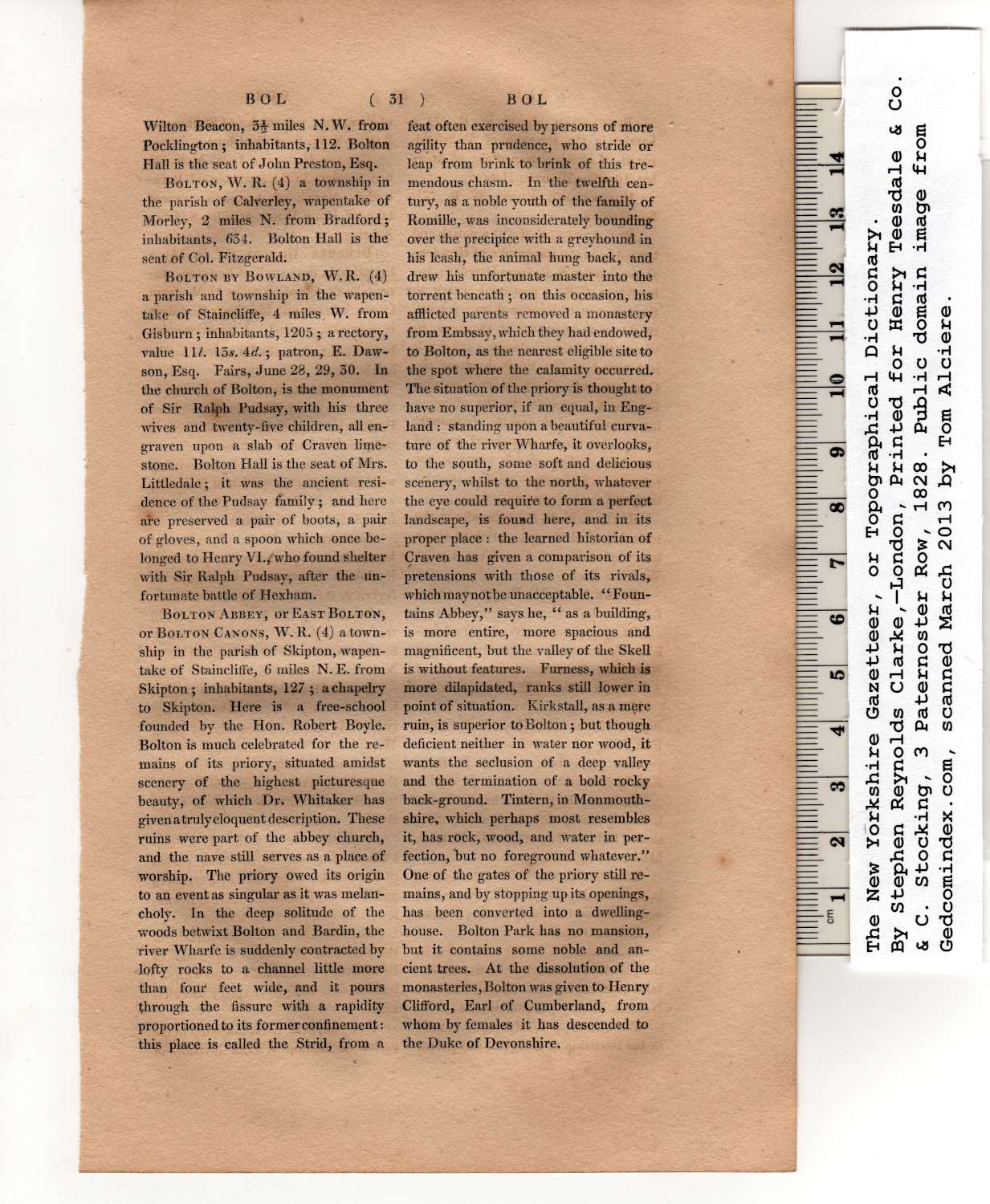|
Wilton Beacon, 3£ miles N. W. from
Pocklington; inhabitants, 112. Bolton
Hall is the seat of John Preston, Esq.
Bolton, W. R. (4) a township in
the parish of Calverley, wapentake of
Morley, 2 miles N. from Bradford;
inhabitants, 634. Bolton Hall is the
seat of Col. Fitzgerald.
Bolton by Bowland, W.R. (4)
a parish and township in the wapen-
take of Staincliffe, 4 miles W. from
Gisburn ; inhabitants, 1205 ; a rectory,
value 11/. 13s. 4*/.; patron, E. Daw-
son, Esq. Fairs, June 28, 29, 30. In
the church of Bolton, is the monument
of Sir Ralph Pudsay, with his three
wives and twenty-five children, all en-
graven upon a slab of Craven lime-
stone. Bolton Hall is the seat of Mrs.
Littledale; it was the ancient resi-
dence of the Pudsay family; and here
are preserved a pair of boots, a pair
of gloves, and a spoon which once be-
longed to Henry Vl./who found shelter
with Sir Ralph Pudsay, after the un-
fortunate battle of Hexham. |
Bolton Abbey, or East Bolton,
or Bolton Canons, W.R. (4) a town-
ship in the parish of Skipton, wapen-
take of Staincliffe, 6 miles N. E. from
Skipton; inhabitants, 127 ; a ehapelry
to Skipton. Here is a free-school
founded by the Hon. Robert Boyle.
Bolton is much celebrated for the re-
mains of its priory, situated amidst
scenery of the highest picturesque
beauty, of which Dr. Whitaker has
given a truly eloquent description. These
ruins were part of the abbey church,
and the nave still serves as a place of
worship. The priory owed its origin
to an event as singular as it was melan-
choly. In the deep solitude of the
woods betwixt Bolton and Bardin, the
river Wharfe is suddenly contracted by
lofty rocks to a channel little more
than four feet wide, and it pours
through the fissure with a rapidity
proportioned to its former confinement:
this place is called the Strid, from a
feat often exercised by persons of more
agility than prudence, who stride or
leap from brink to brink of this tre-
mendous chasm. In the twelfth cen-
tury, as a noble youth of the family of
Romille, was inconsiderately bounding
over the precipice with a greyhound in
his leash, the animal hung back, and
drew his unfortunate master into the
torrent beneath; on this occasion, his
afflicted parents removed a monastery
from Embsay, which they had endowed,
to Bolton, as the nearest eligible site to
the spot where the calamity occurred.
The situation of the priory is thought to
have no superior, if an equal, in Eng-
land : standing upon a beautiful curva-
ture of the river Wharfe, it overlooks,
to the south, some soft and delicious
scenery, whilst to the north, whatever
the eye could require to form a perfect
landscape, is found here, and in its
proper place : the learned historian of
Craven has given a comparison of its
pretensions with those of its rivals,
which may not be unacceptable. “Foun-
tains Abbey,” says he, “as a building,
is more entire, more spacious and
magnificent, but the valley of the Skell
is without features. Furness, which is
more dilapidated, ranks still lower in
point of situation. Kirkstall, as a mere
ruin, is superior to Bolton; but though
deficient neither in water nor wood, it
wants the seclusion of a deep valley
and the termination of a bold rocky
back-ground. Tintern, in Monmouth-
shire, which perhaps most resembles
it, has rock, wood, and water in per-
fection, but no foreground whatever.”
One of the gates of the priory still re-
mains, and by stopping up its openings,
has been converted into a dwelling-
house. Bolton Park has no mansion,
but it contains some noble and an-
cient trees. At the dissolution of the
monasteries, Bolton was given to Henry
Clifford, Earl of Cumberland, from
whom by females it has descended to
the Duke of Devonshire. |
